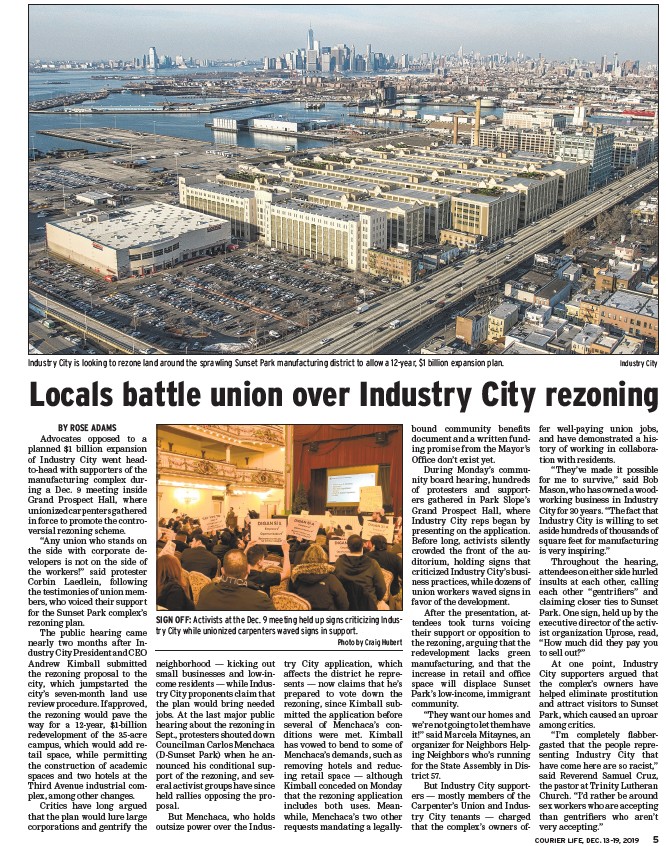
Industry City is looking to rezone land around the sprawling Sunset Park manufacturing district to allow a 12-year, $1 billion expansion plan. Industry City
Locals battle union over Industry City rezoning
COURIER LIFE, DEC. 13-19, 2019 5
BY ROSE ADAMS
Advocates opposed to a
planned $1 billion expansion
of Industry City went headto
head with supporters of the
manufacturing complex during
a Dec. 9 meeting inside
Grand Prospect Hall, where
unionized carpenters gathered
in force to promote the controversial
rezoning scheme.
“Any union who stands on
the side with corporate developers
is not on the side of
the workers!” said protester
Corbin Laedlein, following
the testimonies of union members,
who voiced their support
for the Sunset Park complex’s
rezoning plan.
The public hearing came
nearly two months after Industry
City President and CEO
Andrew Kimball submitted
the rezoning proposal to the
city, which jumpstarted the
city’s seven-month land use
review procedure. If approved,
the rezoning would pave the
way for a 12-year, $1-billion
redevelopment of the 35-acre
campus, which would add retail
space, while permitting
the construction of academic
spaces and two hotels at the
Third Avenue industrial complex,
among other changes.
Critics have long argued
that the plan would lure large
corporations and gentrify the
neighborhood — kicking out
small businesses and low-income
residents — while Industry
City proponents claim that
the plan would bring needed
jobs. At the last major public
hearing about the rezoning in
Sept., protesters shouted down
Councilman Carlos Menchaca
(D-Sunset Park) when he announced
his conditional support
of the rezoning, and several
activist groups have since
held rallies opposing the proposal.
But Menchaca, who holds
outsize power over the Industry
City application, which
affects the district he represents
— now claims that he’s
prepared to vote down the
rezoning, since Kimball submitted
the application before
several of Menchaca’s conditions
were met. Kimball
has vowed to bend to some of
Menchaca’s demands, such as
removing hotels and reducing
retail space — although
Kimball conceded on Monday
that the rezoning application
includes both uses. Meanwhile,
Menchaca’s two other
requests mandating a legallybound
community benefi ts
document and a written funding
promise from the Mayor’s
Offi ce don’t exist yet.
During Monday’s community
board hearing, hundreds
of protesters and supporters
gathered in Park Slope’s
Grand Prospect Hall, where
Industry City reps began by
presenting on the application.
Before long, activists silently
crowded the front of the auditorium,
holding signs that
criticized Industry City’s business
practices, while dozens of
union workers waved signs in
favor of the development.
After the presentation, attendees
took turns voicing
their support or opposition to
the rezoning, arguing that the
redevelopment lacks green
manufacturing, and that the
increase in retail and offi ce
space will displace Sunset
Park’s low-income, immigrant
community.
“They want our homes and
we’re not going to let them have
it!” said Marcela Mitaynes, an
organizer for Neighbors Helping
Neighbors who’s running
for the State Assembly in District
57.
But Industry City supporters
— mostly members of the
Carpenter’s Union and Industry
City tenants — charged
that the complex’s owners offer
well-paying union jobs,
and have demonstrated a history
of working in collaboration
with residents.
“They’ve made it possible
for me to survive,” said Bob
Mason, who has owned a woodworking
business in Industry
City for 30 years. “The fact that
Industry City is willing to set
aside hundreds of thousands of
square feet for manufacturing
is very inspiring.”
Throughout the hearing,
attendees on either side hurled
insults at each other, calling
each other “gentrifi ers” and
claiming closer ties to Sunset
Park. One sign, held up by the
executive director of the activist
organization Uprose, read,
“How much did they pay you
to sell out?”
At one point, Industry
City supporters argued that
the complex’s owners have
helped eliminate prostitution
and attract visitors to Sunset
Park, which caused an uproar
among critics.
“I’m completely fl abbergasted
that the people representing
Industry City that
have come here are so racist,”
said Reverend Samuel Cruz,
the pastor at Trinity Lutheran
Church. “I’d rather be around
sex workers who are accepting
than gentrifi ers who aren’t
very accepting.”
SIGN OFF: Activists at the Dec. 9 meeting held up signs criticizing Industry
City while unionized carpenters waved signs in support.
Photo by Craig Hubert